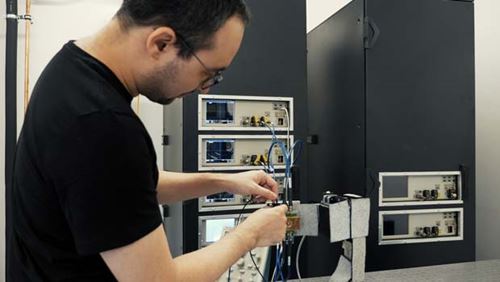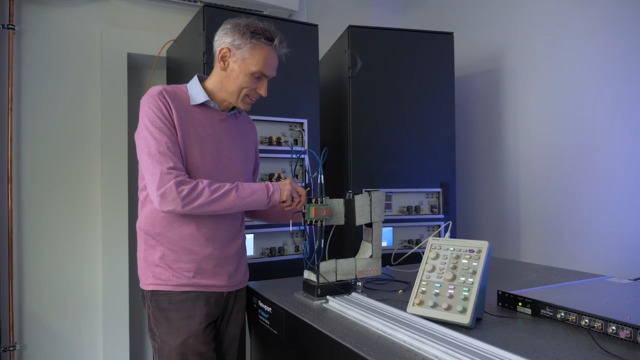Contactez-nous
Chat en direct avec un représentant Tek. Service disponible de 9 h à 17 h, CET jours ouvrables.
Appelez-nous au
Disponible de 9 h à 17 h CET jours ouvrables.
Télécharger
Télécharger des manuels, des fiches techniques, des logiciels, etc. :
Feedback
University of Wuppertal
University of Wuppertal researchers aim to create a more sustainable future with 6G
As the communications industry evolves and new mobile networks are rolled out, researchers are using this emerging technology to make significant advancements in a variety of fields, ranging from healthcare to energy to agriculture. The faster transmission of data and low latency of 5G is expected to alter our world in ways big and small. And although 5G is still being rolled out, a research team at Germany’s University of Wuppertal is already looking ahead at how to develop the technology needed to quickly deploy 6G.
Why? Because 6G may be the key to a more sustainable future for our planet.
Unlocking 6G’s transformative powers

It’s anticipated that the 6G network will greatly increase the speed of our internet, expand the capabilities of IoT sensors and improve overall connectivity services. For example, 6G is expected to have the bandwidth to offer 360-degree, 16K videos or holographic displays, and transform our ability to exchange huge amounts of complex, time-sensitive data.
While these advancements will provide opportunities across all industries, of most interest to the University of Wuppertal research team is the impact 6G will have on environmentalism and sustainability. The deployment of 6G technology supports the United Nations Sustainable Development Goals (SDGs), which are aimed at making the planet more livable by 2030 by eradicating poverty, enabling gender equality, combating climate change and developing smart cities. And 6G is a key tool in achieving these ambitions.
Creating cutting-edge components
The University of Wuppertal’s project focuses on developing technology to make 6G a reality. The team is focused on components that will allow for higher data throughputs while cutting network latency, resulting in real-time, high-density data exchanges.
At this time, the team is specifically focused on creating a higher performing THz transceiver. 6G will require a transceiver that supports increased data rates using multiple channels and one that balances speed with energy use. The results and findings of the team’s research will help the Institute of Electrical and Electronics Engineers (IEEE) create new standards that will define the performance and protocols of future 6G networks.
Developing revolutionary technology requires revolutionary instruments
Because the team is developing cutting-edge technology, they needed advanced test and measurement equipment that could take measurements on components that are operating at the theoretical limits of performance.
“Our experiments will operate at the limits of the technology and available test instruments,” claimed Dr. Ullrich Pfeiffer, Professor at Wuppertal University. “We therefore needed equipment that is on the edge of technological capabilities.”

The team needed instruments that could demonstrate the best vertical resolution, the best residual Error Vector Magnitude (EVM), a large memory and the ability to synchronize multiple instruments.
After carefully considering a number of vendors, Dr. Pfeiffer and his team chose to work with Tektronix. With the help of the Tektronix team, the researchers settled on a suite of configurable oscilloscopes, waveform generators and signal analysis software.
The researchers were particularly interested in the modular construction of the Tektronix products and the way the instruments worked together. This modularity allows the team to increase the number of channels the instruments can read simultaneously. The equipment also features strong internet connectivity, self-calibration, and an open hardware and software architecture, which allows researchers to test innovative algorithms. These features will significantly reduce the amount of time the team needs to set up their measurements and the instruments offer higher accuracy and repeatability than many other products on the market.
A partner in bettering the world
Beyond the technical advantages of Tektronix instruments, the researchers were also impressed with the ongoing technical support Tektronix offers. Because the research team was developing new, high-performance components, they were looking for a true partner and felt the team at Tektronix understood the challenges they were facing.
“We were pleased to have found Tektronix, as access to their technical experts made our team feel safe and supported,” noted Dr. Pfeiffer. “By working with the global team of Tektronix engineers in this cooperative way, we feel we can really unlock the ‘magic’ in Tektronix solutions.”
Though the team is still in the initial stage of their research, they are making incredible strides toward creating a more sustainable future. And Tektronix couldn’t be more supportive of that endeavor.


